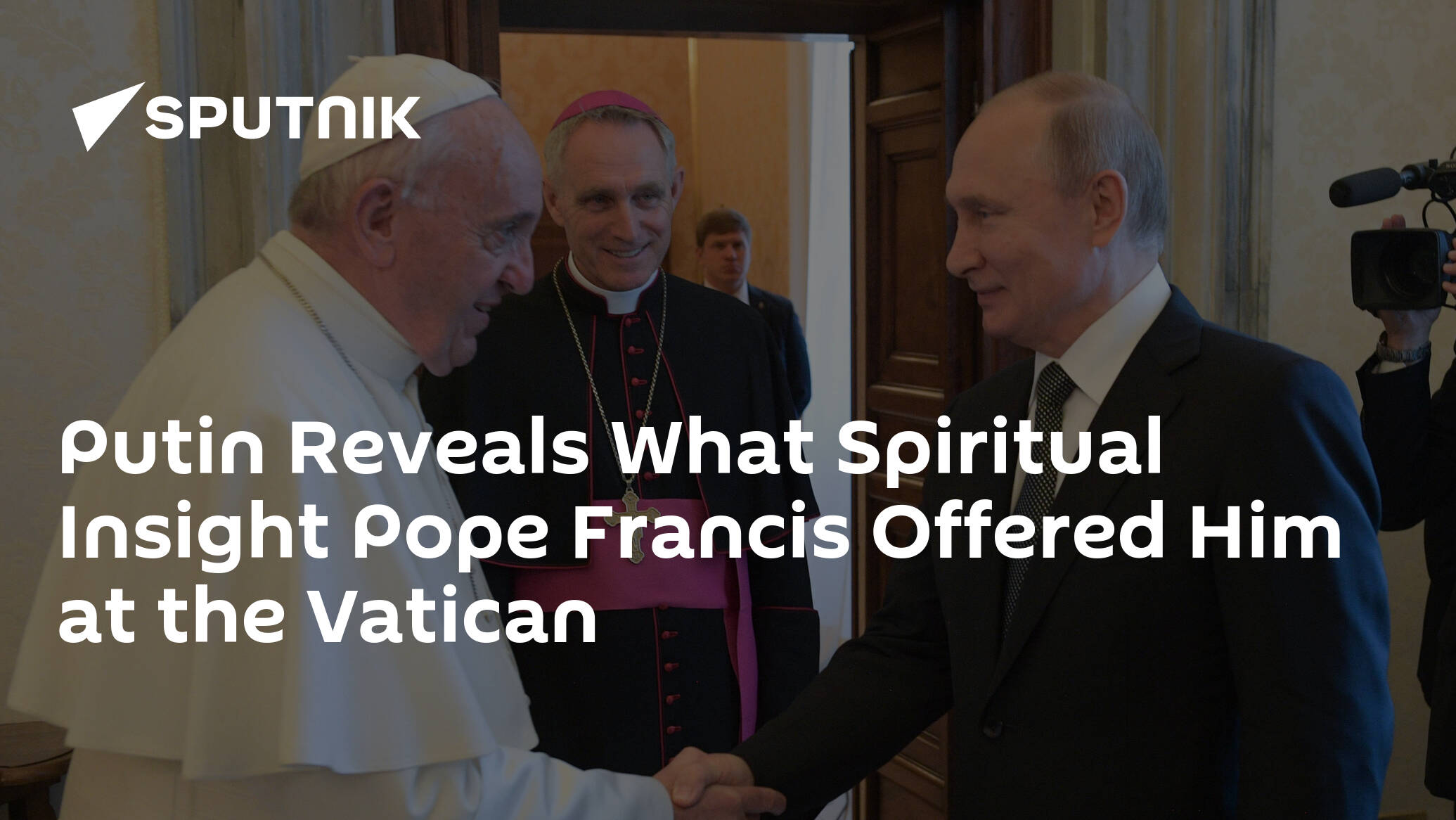Dostoevsky is in the news again and this time in connection with Putin and the Pope:
The Russian president also mentioned what kind of books the pope always has lying on his desk, though he did not specify the books’ titles.

sputniknews.com
Putin Reveals What Spiritual Insight Pope Francis Offered Him at the Vatican
© Sputnik / Alexei Druzhinin
EUROPE
14:14 05.07.2019Get short URL
5233
The Russian president also mentioned what kind of books the pope always has lying on his desk, though he did not specify the books’ titles.
While attending a dinner with representatives of the Russian-Italian Civil Society Dialogue Forum, hosted by the Italian government at Villa Madama, Russian President Vladimir Putin has shed the light on some of the things he discussed with Pope Francis at their recent
meeting at the Vatican, pointing out that the pontiff gave his approval to disclose this portion of their conversation.
The president revealed that the pope always has books by Leo Tolstoy and Fyodor Dostoevsky lying on his desk, though he did not specify the books’ titles, and that
the pontiff argued that "without Dostoevsky’s books, without understanding the depth of his philosophy, one cannot be a true priest".
"You know, that speaks volumes. That speaks about our common spiritual roots", Putin remarked.
Russian President Vladimir Putin visited Italy on 4 July, holding talks with Italian Prime Minister
Giuseppe Conte and President Sergio Mattarella, as well as meeting with Pope Francis at the Vatican.
----
I have just read a couple of Dostoevsky's books,
Crime and Punishment and
The Idiot and have started on
The Brothers Karamazov. They are really amazing books, so I am not surprised to hear that the Pope speaks highly of Dostoevsky, though Dostoevsky is highly critical of the Catholic Church.
Below are some excerpts from the Book, The Idiot where Dostoevsky through the character, Prince Myshkin speaks about the Catholic church. All excerpts are from the pdf version of the book from Planet pdf.:
‘Pavlicheff was a man of bright intellect and a good
Christian, a sincere Christian,’ said the prince, suddenly.
‘How could he possibly embrace a faith which is
unchristian?
Roman Catholicism is, so to speak, simply the
same thing as unchristianity,’ he added with flashing eyes,
which seemed to take in everybody in the room.
‘Come, that’s a little TOO strong, isn’t it?’ murmured
the old man, glancing at General Epanchin in surprise.
‘How do you make out that the Roman Catholic
religion is UNCHRISTIAN? What is it, then?’ asked Ivan
Petrovitch, turning to the prince.
‘It is not a Christian religion, in the first place,’ said the
latter, in extreme agitation, quite out of proportion to the
necessity of the moment. ‘And in the second place,
Roman Catholicism is, in my opinion, worse than
Atheism itself. Yes— that is my opinion. Atheism only
preaches a negation, but Romanism goes further; it
preaches a disfigured, distorted Christ—it preaches Anti
1007 of 1149
Christ—I assure you, I swear it! This is my own personal
conviction, and it has long distressed me. The Roman
Catholic believes that the Church on earth cannot stand
without universal temporal Power. He cries ‘non
possumus!’
In my opinion the Roman Catholic religion is
not a faith at all, but simply a continuation of the Roman
Empire, and everything is subordinated to this idea—
beginning with faith. The Pope has seized territories and
an earthly throne, and has held them with the sword. And
so the thing has gone on, only that to the sword
they have
added lying, intrigue, deceit, fanaticism, superstition,
swindling;—they have played fast and loose with the most
sacred and sincere feelings of men;—they have exchanged
everything—everything for money, for base earthly
POWER!
And is this not the teaching of Anti-Christ?
How could the upshot of all this be other than Atheism?
Atheism is the child of Roman Catholicism—it proceeded
from these Romans themselves, though perhaps they
would not believe it. It grew and fattened on hatred of its
parents; it is the progeny of their lies and spiritual
feebleness. Atheism! In our country it is only among the
upper classes that you find unbelievers; men who have lost
the root or spirit of their faith;
but abroad whole masses of
the people are beginning to profess unbelief—at first
1008 of 1149
because of the darkness and lies by which they were
surrounded; but now out of fanaticism, out of loathing for
the Church and Christianity!’(
I think he is above speaking about the West)
The prince paused to get breath. He had spoken with
extraordinary rapidity, and was very pale.
All present interchanged glances, but at last the old
dignitary burst out laughing frankly. Prince N. took out
his eye-glass to have a good look at the speaker. The
German poet came out of his corner and crept nearer to
the table, with a spiteful smile.
‘You exaggerate the matter very much,’ said Ivan
Petrovitch, with rather a bored air. ‘There are, in the
foreign Churches, many representatives of their faith who
are worthy of respect and esteem.’
‘Oh, but I did not speak of individual representatives.
I
was merely talking about Roman Catholicism, and its
essence—of Rome itself. A Church can never entirely
disappear; I never hinted at that!’
‘Agreed that all this may be true; but we need not
discuss a subject which belongs to the domain of
theology.’
‘Oh, no; oh, no! Not to theology alone, I assure you!
Why, Socialism is the progeny of Romanism and of the
Romanistic spirit. It and its brother Atheism proceed from
1009 of 1149
Despair in opposition to Catholicism. It seeks to replace in
itself the moral power of religion, in order to appease the
spiritual thirst of parched humanity and save it; not by
Christ, but by force. ‘Don’t dare to believe in God, don’t
dare to possess any individuality, any property! Fraternite
ou la Mort; two million heads.
‘By their works ye shall
know them’—we are told.
And we must not suppose that
all this is harmless and without danger to ourselves. Oh,
no; we must resist, and quickly, quickly! We must let out
Christ shine forth upon the Western nations, our Christ
whom we have preserved intact, and whom they have
never known. Not as slaves, allowing ourselves to be
caught by the hooks of the Jesuits, but carrying our
Russian civilization to THEM, we must stand before
them, not letting it be said among us that their preaching
is ‘skilful,’ as someone expressed it just now.’
‘But excuse me, excuse me;’ cried Ivan Petrovitch
considerably disturbed, and looking around uneasily.
‘Your ideas are, of course, most praiseworthy, and in the
highest degree patriotic; but you exaggerate the matter
terribly. It would be better if we dropped the subject.’
‘No, sir, I do not exaggerate, I understate the matter, if
anything, undoubtedly understate it; simply because I
cannot express myself as I should like, but—‘
[...]
Oh, it is not from vanity alone, it is not from
feelings of vanity that Russians become Atheists and
Jesuits! But from spiritual thirst, from anguish of longing
for higher things, for dry firm land, for foothold on a
fatherland which they never believed in because they
never knew it. It is easier for a Russian to become an
Atheist, than for any other nationality in the world. And
not only does a Russian ‘become an Atheist,’ but he
actually BELIEVES IN Atheism, just as though he had
found a new faith, not perceiving that he has pinned his
1012 of 1149
faith to a negation. Such is our anguish of thirst! ‘Whoso
has no country has no God.’ That is not my own
expression; it is the expression of a merchant, one of the
Old Believers, whom I once met while travelling. He did
not say exactly these words. I think his expression was:
‘‘Whoso forsakes his country forsakes his God.’
‘But let these thirsty Russian souls find, like Columbus’
discoverers, a new world; let them find the Russian world,
let them search and discover all the gold and treasure that
lies hid in the bosom of their own land!
Show them the
restitution of lost humanity, in the future, by Russian
thought alone, and by means of the God and of the Christ
of our Russian faith, and you will see how mighty and just
and wise and good a giant will rise up before the eyes of
the astonished and frightened world; astonished because
they expect nothing but the sword from us, because they
think they will get nothing out of us but barbarism. This
has been the case up to now, and the longer matters go on
as they are now proceeding, the more clear will be the
truth of what I say; ...
---
This last highlighted paragraph is quite prophetic as it is what we are seeing now, 150 years after Dostoevsky wrote this book. Under Putin a mighty, wise, good and just giant is rising and the world only expected barbarism from Russia.
Interestingly, the
Pope gave Putin a medal with the inscription "Guardian Angel of the World".
Putin in his interview to the Financial Times 10 days ago was however conciliatory of the Catholic Church and like Jordan Peterson showed concern of the dangers of destroying something that despite faults upholds order and a cultural identity.
Here is what he said:
VP: It should play its current role. It [religion] cannot be pushed out of this cultural space. We should not abuse anything.
Russia is an Orthodox Christian nation, and there have always been problems between Orthodox Christianity and the Catholic world. This is exactly why I will now say a few words about Catholics. Are there any problems there? Yes, there are, but they cannot be over-exaggerated and used for destroying the Roman Catholic Church itself. This is what cannot be done.
Sometimes, I get the feeling that these liberal circles are beginning to use certain elements and problems of the Catholic Church as a tool for destroying the Church itself. This is what I consider to be incorrect and dangerous.
All right, have we forgotten that all of us live in a world based on biblical values? Even atheists and everyone else live in this world. We do not have to think about this every day, attend church and pray, thereby showing that we are devout Christians or Muslims or Jews. However, deep inside, there must be some fundamental human rules and moral values. In this sense, traditional values are more stable and more important for millions of people than this liberal idea, which, in my opinion, is really ceasing to exist.
Dostoevsky does not speak about Lutheranism, but instead mentions that atheism and socialism was a reaction to this abuse by the Catholic church. Luc has
in this thread given a very good break down of Lutheranism and how it split the Christian church and brought materialism, atheism and a disconnect from a spiritual connection.


